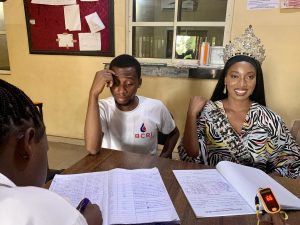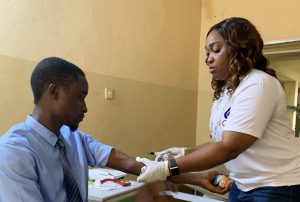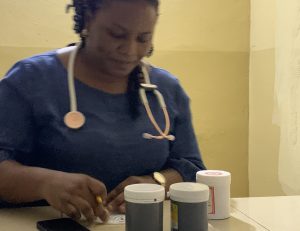Advancing Understandings of Blood Donation Motivation and Behavior in Nigeria
Advancing Understandings of Blood Donation Motivation and Behavior in Nigeria.
Blood donation is a critical component of healthcare systems worldwide, ensuring that medical facilities are equipped to handle emergencies, surgeries, and ongoing medical treatments. In Nigeria, the need for blood donations is paramount, yet the country faces challenges in ensuring a steady and sufficient supply. Understanding the motivations and behaviors surrounding blood donation in Nigeria is crucial to improving donation rates and addressing the public health needs of the nation.
Blood Donation Landscape in Nigeria.
Nigeria, with a population of over 200 million people, has a significant demand for blood, particularly due to the prevalence of diseases such as malaria, anemia, and sickle cell disorder, alongside emergencies like accidents and childbirth complications. The Nigerian government and healthcare organizations have long recognized the need for a robust system of voluntary blood donation. However, despite these efforts, the country still faces challenges in meeting the national demand for blood, often relying on family replacement donations, which may not always be available when needed. A key issue is the low rate of voluntary blood donation. Studies have shown that only a small percentage of Nigerians regularly donate blood, with many choosing not to donate due to fear, misinformation, or lack of awareness. Thus, it is essential to explore what motivates individuals to donate blood in Nigeria, as well as the barriers they face, to develop more effective strategies for increasing donation rates.
Motivations for Blood Donation
Understanding the factors that influence blood donation behavior in Nigeria is crucial for creating targeted interventions. Motivational factors can be broadly categorized into altruistic, social, and personal reasons.
1. Altruistic Motivations: Altruism plays a significant role in blood donation. Many Nigerians are motivated by the desire to help others, particularly those who are in urgent need of blood. This sense of empathy for patients in need, as well as the belief that their donation could save lives, is a powerful motivator. Blood donation campaigns in Nigeria often emphasize the life-saving potential of donations, appealing to people’s innate desire to contribute to society and help those in distress.
2. Social and Cultural Influences: Social factors also significantly impact blood donation behaviors in Nigeria. In many communities, blood donation is seen as a communal responsibility, especially in rural areas. Word-of-mouth and community leaders can have a significant influence in encouraging or discouraging blood donations. Social networks, including religious groups and workplace settings, also serve as platforms to raise awareness and encourage participation. Cultural perceptions, however, can sometimes be a hindrance, particularly in societies where there is a belief that blood donation may lead to weakness or illness.
3. Personal and Emotional Motivations: Personal experiences often drive people to donate blood. Some individuals donate blood after witnessing a loved one’s need for it during an emergency or illness. Similarly, those who have received blood transfusions themselves may feel a sense of gratitude and a desire to give back to the community. Emotional appeals, such as stories of children or pregnant women in need of blood, also stimulate donations by creating a sense of urgency and emotional connection to the cause.
4. Incentives and Recognition: While the primary motivation for many Nigerians to donate blood is altruistic, some are also encouraged by incentives or recognition. Blood donation organizations sometimes offer small rewards, certificates, or free health checkups in exchange for donations. While such incentives may not be the primary motivator, they help make the process more appealing and can encourage first-time donors who may be hesitant.
Barriers to Blood Donation
While there are several motivations for donating blood, there are also numerous barriers that discourage regular blood donation in Nigeria. These include:
1. Lack of Awareness: One of the main barriers to blood donation in Nigeria is a lack of awareness about the importance of regular blood donation and the process involved. Many Nigerians do not fully understand the critical need for blood donations and may be unaware of the safety measures taken during blood collection. Misinformation or myths surrounding blood donation, such as concerns about the risk of HIV or other infections, can also deter individuals from donating.
2. Fear and Pain: Fear of the needle, the donation process, and potential side effects are common deterrents to blood donation. For many Nigerians, the process of giving blood is perceived as painful or uncomfortable, even though the procedure is relatively safe and painless. These fears can prevent potential donors, especially first-time donors, from participating.
3. Health Concerns: Some individuals may have concerns about their health status when donating blood, fearing that it could negatively impact their well-being. Concerns about weakness, fatigue, or complications from donating are common, particularly among those with underlying health conditions or those who do not fully understand the medical safety protocols followed by blood banks.
4. Inadequate Blood Donation Infrastructure: The lack of a well-established infrastructure for blood donation and collection in certain areas is another significant barrier. Blood collection centers may be scarce or inconveniently located, particularly in rural or underserved areas. Additionally, inadequate blood storage facilities and a lack of trained personnel can affect the efficiency of the blood donation process.
Improving Blood Donation Motivation and Behavior in Nigeria.To increase blood donation rates in Nigeria, it is essential to address both the motivating factors and barriers identified above. Some strategies include:1. Educational Campaigns: Comprehensive education campaigns should be implemented to raise awareness about the importance of voluntary blood donation. These campaigns should focus on dispelling myths, educating the public about the safety and benefits of blood donation, and highlighting the critical need for blood in healthcare. 2. Community Engagement: Community leaders, religious institutions, and social groups can play a central role in promoting blood donation. Local leaders can influence attitudes toward blood donation and encourage participation through community-based initiatives and peer pressure. 3. Incentivizing Donation: While the primary focus should be on altruistic motivations, providing small incentives or recognizing donors can help encourage people to donate. Blood donation organizations can introduce programs that reward frequent donors or offer health benefits like free medical checkups and blood screenings.
4. Improving Access and Infrastructure: Expanding blood donation centers and improving access to healthcare services in underserved regions of Nigeria is critical. Mobile blood donation units and partnerships with hospitals can ensure that more Nigerians have access to donation facilities. Additionally, ensuring the proper storage, handling, and transportation of blood can improve the efficiency of the donation process. In conclusion, advancing the understanding of blood donation motivation and behavior in Nigeria is crucial for addressing the country’s blood supply challenges. By focusing on the motivations for blood donation and overcoming the barriers that discourage it, Nigeria can improve the availability of blood, ultimately saving lives and supporting its healthcare system. Effective awareness campaigns, community engagement, and improved infrastructure will be key in fostering a culture of regular, voluntary blood donation in the country. With a collective effort from the government, health organizations, and the public, Nigeria can create a sustainable and reliable blood donation system.






